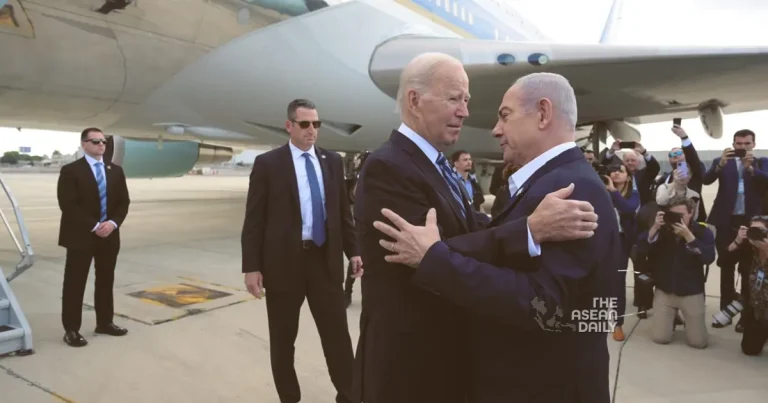18-10-2023 (TEL AVIV) President Joe Biden, during his visit to Israel on Wednesday, reassured the nation of the United States’ unwavering support for Israelis while addressing the tragic explosion at a Gaza Strip hospital. He also expressed his belief that the explosion was not the result of actions by the Israeli military.
In a meeting with Israeli Prime Minister Benjamin Netanyahu, President Biden conveyed his assessment, saying, “Based on what I’ve seen, it appears as though it was done by the other team, not you.” However, he acknowledged that there was uncertainty surrounding the exact cause of the blast.
Biden did not provide specific details about why he believed the explosion was not caused by the Israelis. The Hamas-run Gaza Health Ministry attributed the destruction and loss of hundreds of lives to an Israeli airstrike, while the Israeli military denied involvement and pointed to a misfired rocket from the Palestinian Islamic Jihad, another militant group, as the possible cause. However, the Palestinian Islamic Jihad also denied responsibility for the incident.
The U.S. President had originally planned to visit Jordan to meet with Arab leaders after his visit to Israel, but the summit was canceled in the wake of the hospital explosion. During his remarks, President Biden expressed both his condolences for the suffering endured by Israelis and his concern for the growing humanitarian crisis facing Palestinian civilians in Gaza.
He emphasized that “Hamas does not represent all the Palestinian people and has brought them only suffering.” President Biden stressed the need to find ways to provide life-saving assistance to innocent Palestinians caught in the midst of the conflict.
However, he also highlighted the October 7 attack in which Hamas “slaughtered” Israelis, resulting in the loss of 1,400 lives, including children. Biden acknowledged the grief and concern of the American people over these events.
Prime Minister Netanyahu expressed his gratitude to President Biden for his visit, stating, “I know I speak for all the people of Israel when I say thank you, Mr. President, thank you for standing with Israel today, tomorrow, and always.” He emphasized the clear distinction made by Biden between the “forces of civilization and the forces of barbarism” and Israel’s determination to defeat Hamas.
“The civilized world must unite to defeat Hamas,” Netanyahu added.
During his visit, President Biden also planned to meet with Israeli first responders and the families of victims and hostages. His visit to Israel comes at a time when the possibility of improved relations between Israel and its Arab neighbors appears to be diminishing. Israel has been preparing for a potential ground invasion of Gaza in response to Hamas’ attacks.
Reports indicate that approximately 2,800 Palestinians have been killed by Israeli strikes in Gaza, with another 1,200 people believed to be buried under the rubble, either alive or deceased, according to health authorities. These figures do not account for the casualties resulting from the recent hospital explosion.
The hospital explosion sparked protests throughout the region, with Palestinians taking to the streets in major West Bank cities, including Ramallah. Protests also erupted in Beirut, Lebanon, and Amman, Jordan, where demonstrators gathered outside the Israeli Embassy in anger.
The outrage surrounding the hospital explosion led to the cancellation of President Biden’s plans to visit Jordan, where King Abdullah II was to host meetings with Palestinian President Mahmoud Abbas and Egyptian President Abdel Fattah el-Sissi. Abbas withdrew from the summit in protest, and the summit was subsequently called off.
Jordan’s foreign minister, Ayman Safadi, described the situation as “pushing the region to the brink” and declared three days of mourning in the wake of the hospital explosion.
Riyad Mansour, the Palestinian U.N. ambassador, called on President Biden to urge Israel to halt its military operations in Gaza and allow humanitarian assistance to reach those in need.
There are also concerns that a new conflict may erupt along Israel’s northern border with Lebanon, where Hezbollah operates. The Iran-backed organization has engaged in skirmishes with Israeli forces.
President Biden’s visit to Israel coincides with escalating humanitarian concerns in Gaza, where the flow of essential supplies, including food, fuel, and water, has been cut off by Israel. Mediators have been working to break the deadlock over providing aid to desperate civilians, aid groups, and hospitals.
U.S. Secretary of State Antony Blinken, who has been shuttling between Arab and Israeli leaders ahead of President Biden’s visit, spent significant time in Tel Aviv in an effort to broker an agreement on aid delivery to Gaza. His talks led to a change in Israel’s position, allowing for the development of a plan for aid to enter Gaza and reach civilians.
While this development may appear modest, it is significant, as further deterioration of conditions in Gaza could lead to a complete breakdown in Arab tolerance of Israel’s military actions. Such a breakdown could have broader regional implications, potentially encouraging Iran to increase its anti-Israel activities and contributing to the risk of a regional conflict.




